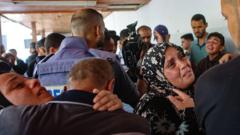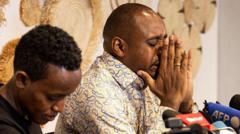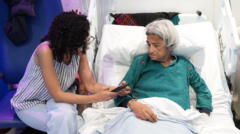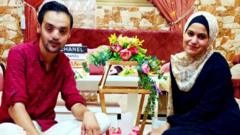**The Congolese government has enacted a ban on media coverage of former President Joseph Kabila, escalating tensions in a fraught political landscape marked by accusations and conflict.**
**DR Congo Imposes Media Ban on Former President Kabila Activities**

**DR Congo Imposes Media Ban on Former President Kabila Activities**
**Tensions rise as government limits reporting on Joseph Kabila amid political unrest and allegations of treason.**
The Democratic Republic of Congo's government has officially prohibited the media from covering the activities of ex-President Joseph Kabila or conducting interviews with members of his political party. This decision follows Kabila's return to the country last month, after spending two years abroad, where he now finds himself amid increasing hostilities with the current administration led by President Félix Tshisekedi.
The government has issued accusations of treason against Kabila, which includes alleged ties to the M23 rebel group currently engaged in armed conflict with Congolese forces—allegations that Kabila has vigorously denied. Christian Bosembe, head of the country's media regulatory body, declared that any breach of this ban could lead to strict punitive measures, including suspensions for violating media outlets.
In a counter-response, a spokesperson for the M23 asserted that news organizations within the territories they control would not recognize the imposed ban. While Kabila has yet to publicly respond to the government's actions, his party's secretary labeled the restrictions as "arbitrary" via social media platform X.
Kabila, who was recently observed in the eastern city of Goma—an area under the control of the M23—has expressed strongcriticism towards the current government, especially following a senate decision to revoke his parliamentary immunity, allowing for potential prosecution related to his supposed support for the rebels.
Reports of Rwanda allegedly providing assistance to the M23 militia have added another layer of complexity to the matter, although the Rwandan government has denied these claims. Kabila has made several incendiary remarks against the ruling government, characterizing it as a "dictatorship," to which government representatives retorted that he has "nothing to offer."
Human rights activists, such as Jean-Claude Katende, have condemned the media ban, denoting it as a blatant "abuse of power." Political commentator Ambroise Mamba warned that such restrictions could backfire, potentially arousing public curiosity about Kabila’s activities and movements. Since his return, Kabila's party has utilized social media to keep the public informed about his engagements with local civil organizations and religious groups in Goma.
Stay updated with further developments on this story as they unfold.
The government has issued accusations of treason against Kabila, which includes alleged ties to the M23 rebel group currently engaged in armed conflict with Congolese forces—allegations that Kabila has vigorously denied. Christian Bosembe, head of the country's media regulatory body, declared that any breach of this ban could lead to strict punitive measures, including suspensions for violating media outlets.
In a counter-response, a spokesperson for the M23 asserted that news organizations within the territories they control would not recognize the imposed ban. While Kabila has yet to publicly respond to the government's actions, his party's secretary labeled the restrictions as "arbitrary" via social media platform X.
Kabila, who was recently observed in the eastern city of Goma—an area under the control of the M23—has expressed strongcriticism towards the current government, especially following a senate decision to revoke his parliamentary immunity, allowing for potential prosecution related to his supposed support for the rebels.
Reports of Rwanda allegedly providing assistance to the M23 militia have added another layer of complexity to the matter, although the Rwandan government has denied these claims. Kabila has made several incendiary remarks against the ruling government, characterizing it as a "dictatorship," to which government representatives retorted that he has "nothing to offer."
Human rights activists, such as Jean-Claude Katende, have condemned the media ban, denoting it as a blatant "abuse of power." Political commentator Ambroise Mamba warned that such restrictions could backfire, potentially arousing public curiosity about Kabila’s activities and movements. Since his return, Kabila's party has utilized social media to keep the public informed about his engagements with local civil organizations and religious groups in Goma.
Stay updated with further developments on this story as they unfold.



















